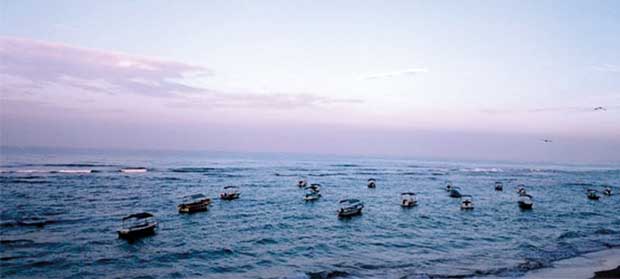Reply To:
Name - Reply Comment
Last Updated : 2024-04-19 06:03:00
The Mullaitivu fishing community went through tremendous devastation during the last phase of the war, the tsunami before that and decades of displacement. Almost every family has lost one or more persons, most of their homes were razed to the ground and their fishing livelihoods brought to a standstill for years. Yet the post-war period has not brought them respite.
During the course of the war, the number of able-bodied fishermen in Mullaitivu had perished. After the war, the Rajapaksa regime further humiliated this population by interning them in camps,  undermined their economic revival with militarized restrictions on fishing and intimidated them for years with surveillance.
undermined their economic revival with militarized restrictions on fishing and intimidated them for years with surveillance.
Sadly, even after regime change two years ago, their economic situation has become worse. Their fishing livelihoods have been undermined by the arrival of hordes of fishing enterprises from other regions. Ironically, it is the Fisheries Ministry responsible for developing sustainable local fisheries that is at the centre of the current controversy. Excessive licences are granted to hundreds of gill-net fishermen and companies that send divers to collect sea cucumber for exports. The large inflow of licensed fishermen has also provided cover for unlicensed fishermen and illegal fishing practices including the use of light course and dynamite, which are all draining the ability of the Mullaitivu fishing community to recover.
Mullaitivu has a long history of migrant fishers from the South who fish between March and August, particularly during the south-west monsoon, and had amicable relations with the local fishing communities. After the war in 2012, the military facilitated the return of some of these migrant fishers. Problematic as the role of the military might have been in such fisheries management, the  Mullaitivu fisher co-operatives agreed initially to 30 and then eventually accepted 78 such migrant fishermen who claimed to have fished in the Mullaitivu waters before the war.
Mullaitivu fisher co-operatives agreed initially to 30 and then eventually accepted 78 such migrant fishermen who claimed to have fished in the Mullaitivu waters before the war.
After regime change in 2015, the number of outside fishers suddenly increased to a few hundred. Worryingly, it was with the active return of the civil administration, particularly the Fisheries Department, that excessive licences were issued, particularly to new “mudalalis” from the South who wanted to exploit the marine resources and sought tens of licences each to bring in fishermen who worked for them. The Mullaitivu fishing communities, which had been confronting the Indian trawlers ravaging their waters for shrimp during the early months of the year, suddenly faced excessive number of powerful fishing enterprises from the South. These developments led to drastically low fish harvest, declining fishing income and rising indebtedness for the coastal Mullaitivu communities.
In this context, over a year ago in April 2016; during a visit by the Fisheries Minister to Mullaitivu, the local fishing community demanded that the Fisheries Ministry restrict the number of licenses provided to “migrant” fishers as it was leading to increasing tensions in the District, particularly in the Nayaru area. In subsequent meetings at the Fisheries Ministry, I was also present in my capacity as a researcher working with the Northern fishing community. In June 2016, a Committee was appointed by the Fisheries Ministry to address the problems between the local fishing community in Mullaitivu and those who came from other regions for gill-net fishing, for collecting sea cucumber and ornamental fish, and for beach seine fishing.

The Committee consisted of nine individuals, including the Divisional Secretary for coastal Mullaitivu, representatives from the Navy and the Army, representatives of the different sections of the Fisheries Ministry, the leader of the fisheries co-operative federation of Mullaitivu, a representative of the migrant fishing community and myself in my capacity as a researcher from the North. After a series of discussions, a report was drafted by early September 2016, drawing on discussions in Colombo as well as local meetings and reports by the District Secretariat in Mullaitivu. However, to date the final report of the Committee has not been launched, and as with so many committees appointed by successive governments to address serious problems, the report of the Committee seems to have been buried.
In the meantime, during my visits to Mullaitivu District over the last two months, there was again the excess of fishermen from the South numbering over 200 this year in Nayaru. Furthermore, tensions are rising around beach seine and lagoon fishing leading to court cases and increased police presence. The problem is clearly the lack of political will and principled fisheries management by the Fisheries Ministry. Given the damage to reconciliation and co-existence, the question arises as to why this state of affairs by the Fisheries Department responsible for fisheries management headed by its Director General? And why is the Fisheries Minister stalling on the promise to address the fisheries problems in Mullaitivu, including through the work of the Committee and its report?
While this fishing conflict may at first sight seem to be a Tamil-Sinhala problem, at the heart of it is tensions between a war-devastated small scale fishing community in Mullaitivu and much better capitalised lucrative fishermen from other regions, who seem to be able to influence the Fisheries Ministry. However, as such problems escalate into a conflict, it inevitably creates deep ethnic divides and takes on an ethnicised character. For all the talk in Colombo by the Government about reconciliation and a political solution, how is it that a serious issue like this, which I fear may even lead to violent clashes, is so irresponsibly ignored?
Fisheries in Sri Lanka and certainly in the North was always about small scale fishing, with as much as twenty percent of the Northern population depending on fisheries. Fisheries in the country was historically managed by customary law and local social institutions. In the North, it is the vibrant fisher co-operatives in each village that have controlled fishing practices and ensured sustainable fishing to last future generations.Yet in recent times, the emphasis on increasing production and growth, with the state attempting to manage fisheries through coercive security apparatuses has in fact led to unsustainable fishing practices by resource exploiting distant actors undermining both the sustainability of marine resources and the livelihoods of rural fishing communities. Therefore, if fisheries is to be sustainable, the local co-operatives should be given a larger role in fisheries co-management and their concerns addressed.
Even as fisheries in the North has been devastated by Indian trawlers and has hit the rocks in Mullaitivu with outside fishers, what would the fishing community make of the larger fisheries development vision of the Government? After decades of neglecting rural economic development, one of the largest development projects for the North is a new Asian Development Bank fisheries development project amounting to a massive US$ 125 million, including the building of large fishing harbours and a number of smaller
landing sites.
Given the problems in Mullaitivu, the Northern fishing communities are increasingly asking the question whether such fisheries development would benefit them. They worry that such large fisheries harbours would only serve powerful fisher bosses in the South and multinational fishing enterprises.

Add comment
Comments will be edited (grammar, spelling and slang) and authorized at the discretion of Daily Mirror online. The website also has the right not to publish selected comments.
Reply To:
Name - Reply Comment
On March 26, a couple arriving from Thailand was arrested with 88 live animal
According to villagers from Naula-Moragolla out of 105 families 80 can afford
Is the situation in Sri Lanka so grim that locals harbour hope that they coul
A recent post on social media revealed that three purple-faced langurs near t

10 Apr 2024
09 Apr 2024